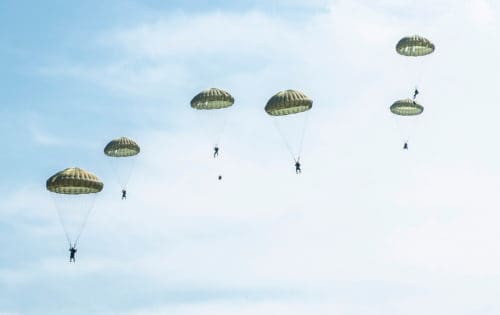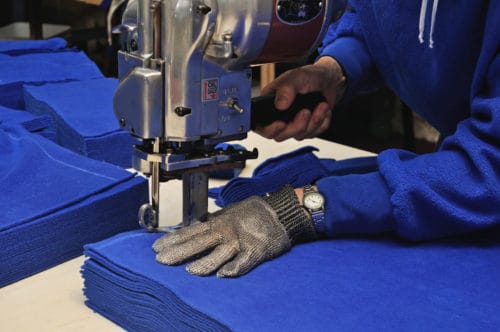What Fabrics Are Parachutes Made Of?
Leave a CommentParachute fabric has to be flexible, lightweight, and durable, and there are several different materials that offer those benefits. Originally made of canvas, then silk, today’s parachutes may be made of ripstop nylon, terylene, or Kevlar, and manufacturers continue to innovate and experiment with materials to find the most effective, affordable, and reliable options for parachutes.
The material itself isn’t as important as what the material can do. Manufacturers look for certain characteristics when developing and using parachute fabrics.
Properties of Parachute Fabric
Parachutes have an important job to do, so the fabric must exhibit certain properties to ensure it can withstand the extreme environment while protecting the people wearing the parachute:
- Strength: The parachute fabric must resist the forces of gravity and drag over the course of hundreds or even thousands of falls. Strong, lightweight materials are easier to repack.
- Tear Resistance: Parachute fabric should resist corrosion and abrasion. A small tear can become a big problem mid-flight—to avoid this issue, ripstop nylon is woven in a regular crosshatch pattern to create small squares that serve to prevent a small tear from becoming larger.
- Elasticity: The fabric must open quickly, and elasticity helps distribute the load more evenly.
- Permeability: Tightly woven fabric helps prevent moisture and dirt from passing through it.
Materials Used in Parachute Fabric
Silk replaced canvas as a parachute fabric because it was lighter, more elastic, thinner, and easier to repack. When the silk supply ran low during World War II, nylon became a go-to choice for parachute fabric. The fact that it’s still used extensively today, even with the availability of options like Kevlar and Dacron, is a testament to its many favorable qualities:
- Elasticity
- Excellent strength-to-weight ratio
- Abrasion resistance
- Chemical resistance
- Wind resistance
- Fire resistance
- Mildew resistance
- Waterproof
- Lightweight
- Affordable
Ripstop nylon is specially woven to offer additional resistance against tearing. It’s available in a variety of colors, thicknesses, and textures ranging from silky to stiff, making it suitable not only for parachutes, but for tents, tarps, flags, banners, and even clothing. Because nylon is so strong, it’s also commonly used for parachute harness straps and other components as well.
For more than 80 years, nylon parachutes have been delivering people and packages safely to the ground. While fabric innovations continue, nylon remains a trusted, economical choice for parachute fabric.
HLC Parachute Supplier of Military-Grade and Commercial Aerial Delivery Systems
As the global leader in parachute fabric supply for both military and commercial aerial delivery systems, HLC is proud to be a fifth generation family company. For more than 100 years, our materials have been trusted in the most demanding and mission-critical applications for military, tactical, and industrial purposes. We’re committed to ongoing research and innovation to provide the best options for our clients. All of our fabrics are woven on state-of-the-art looms under ISO 9001 standards, and they’re finished and tested at U.S. government-certified facilities to ensure they’re safe and effective.
We’re known for creating high-quality products that meet extreme demands, and our customer service team is friendly and responsive. Contact us to learn more about our parachute fabrics, customized solutions, and long history as a leader in mil-spec fabrics, tactical nylon, and more.
Industrial Textile Fabrics: Specifications and Applications
Leave a CommentIndustrial textile manufacturers utilize fiber as the underlying composition for their fabrics. Given the wide array of options for fiber creation and the treatment processes available to manufacturers, companies can create versatile fabrics with features tailored to a customer’s specific application.
Fibers
Fibers are long, thin materials that manufacturers spin to bond into yarn. The fibers that manufacturers choose for this process can imbue the resulting fabric with certain functional qualities, such as durability, breathability, electrical conductivity, and thermal insulation, as well as aesthetic qualities like drape and shine. These fibers come in natural and synthetic options, each having its own advantages.
Natural vs. Synthetic Fibers
Composed of renewable animal (protein) or plant (cellulose) material, natural fibers such as wool and cotton are structurally strong, chemically resistant materials. Their stiffness also lends natural fibers to applications requiring bending stiffness. However, natural fibers are less durable than synthetics and can have market price fluctuations. To help fabrics hold up over time, then, manufacturers can put the material through fiber treatments.
Synthetic fibers are chemically processed polymers that are reliably strong and durable as manufactured yarn, woven textiles, bulk fibers, and other products. While they also provide resistance against chemicals, these fibers can melt under heat and have adverse environmental implications.
Industrial Textiles: Types and Specifications
With all the custom fabrics and fiber treatments available, it is important to choose an industrial material with features that best serve your needs.
Fiber and Fabric Types
- Batting. Batting comes in sheets of thick, loosely webbed fiber layers for thermal applications like bedding or liners.
- Monofilaments. Manufacturers utilize monofilament threads, a single spooled strand of fiber or filament, for woven or knit textiles.
- Natural. Natural plant- or animal-based fabrics include cotton, linen, wool, and silk.
- Rope and cordage. Cordage is composed of twisted yarn strands, with rope being a more durable type of cordage.
- Roving. This fabric consists of continuous filaments in tows.
- Sleeving. Sleevings are insulating fabric wraps that manufacturers make from braided, woven, or knit fibers.
- Thread. Thread comes in mono- or multi-fiber filament constructions of twisted yarn for sewing.
- Webbing. Webbing is an unravelable fabric manufactured as ribbons, tapes, or straps of textile fibers.
- Yarn. Manufacturers generate yarns with standards of interlocked fiber filaments or fabrics and they are available in a wide range of plies for weaving, knitting, and more.
Fabric Characteristics and Features
Manufacturers can custom-make industrial textile fabrics to be:
- Absorbent. Manufacturers can treat signature fabrics to enhance moisture absorption.
- Waterproof. Alternatively, waterproof fabrics won’t degrade in the presence of water but repel it.
- Insulators. Industrial textiles can provide thermal insulation, electrical or dielectric insulation, and soundproofing capabilities.
- Resistant to chemicals and flame. Some materials naturally resist chemicals or fuel, or manufacturers can enhance this resistance with coatings or treatments. Also, flame-retardant fabric resists igniting and can slow the spread of fire.
- Resistant to environmental conditions. In addition to moisture resistance, fabrics with UV treatments won’t degrade when exposed to sunlight or ultraviolet light, making them ideal for exterior applications. Fabrics can potentially withstand temperature fluctuations as well.
- Electrically conductive. Conductive fabrics are useful in anti-static or electrostatic discharge (ESD) applications, offering low levels of electrical resistance.
Industrial Textile Fabric Applications
Manufacturers customize industrial fabrics for applications in a wide array of industrial sectors, including:
- Aerospace
- Automotive
- Chemical
- Clothing
- Construction
- Electrical
- Healthcare
- Marine
Industrial Textile Fabrics From HLC Industries, Inc.
At HLC Industries, we produce high-quality industrial textile fabrics for use across a diverse array of industries and applications. Some of the fabrics we provide include:
- Mil-Spec fabrics. Our fabrics are Berry Amendment-compliant and we can custom-engineer them to meet Mil-Spec standards for military applications.
- Tactical nylon fabrics. We have light- and heavy-weight weave options in our nylon fabrics for high-tech applications.
- Parachute fabrics. We produce specialty fabrics for military and commercial parachutes.
- Commercial fabrics. We manufacture textiles in various weights and weaves with anti-static, anti-microbial, fire-retardant, nIR, and other enhancements.
- INVISTA™ CORDURA® fabrics. These solution-dyed fabrics have a water-repellent finish for nIR spectral reflectance.
- Commercial OCPX camouflage fabrics. These fabrics meet MIL-DTL-32439B specs, with polyurethane fibers and a water-repellent finish.
Learn More About Industrial Textile Fabrics From HLC Industries
HLC Industries is an ISO 9001:2015-certified company that produces Berry Amendment-compliant industrial textile fabrics in the USA. Contact us today to learn more about our 1.1-ounce to 12.0-ounce nylon woven fabrics or to request a quote and start your order.



